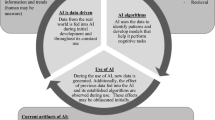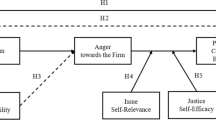Abstract
In three studies, factors influencing the incidence of fraudulent financial reporting were assessed. We examined (1) the effects of personal values and (2) codes of corporate conduct, on whether managers misrepresented financial reports. In these studies, executives and controllers were asked to respond to hypothetical situations involving fraudulent financial reporting procedures. The occurrence of fraudulent reporting was found to be high; however, neither personal values, codes of conduct, nor the interaction of the two factors played a significant role in fraudulent financial reporting.
Similar content being viewed by others
References
Berenbeim, R. E.: 1987,Corporate Ethics (The Conference Board, New York).
Berkowitz, L. and E. Donnerstein: 1982, ‘External Validity is More Than Skin Deep: Some Answers to Criticisms of Laboratory Experiments’,American Psychologist 37, 245–257.
Braithewaite, V. A. and H. G. Law: 1985, ‘Structure of Human Values: Testing the Adequacy of the Rokeach Value Survey’,Journal of Personality and Social Psychology 49, 250–263.
Brief, A. P. and R. J. Aldag: 1989, ‘The Economic Functions of Work’, in K. Rowland and J. Ferris (eds.),Research in Personnel and Human Resources Management (JAI Press, Greenwich, CT).
Brief, A. P., J. M. Dukerich and L. I. Doran: 1991, ‘Resolving Ethical Dilemmas in Management: Experimental Investigations of Values, Accountability, and Choice’,Journal of Applied Social Psychology 21, 380–396.
Brief, A. P. and W. R. Nord: 1990,Meaning of Occupational Work: A Collection of Essays (Lexington Books, Lexington, Mass).
The Business Roundtable: 1988,Corporate Ethics: A Prime Business Asset (The Business Roundtable, New York).
Business Week: 1979, ‘How to Spot the Hotshots’.
Campbell, D. and J. Stanley: 1963,Experimental and Quasi-Experimental Designs for Research (Rand McNally, Chicago).
Cialdini, R. B., A. Levy, C. P. Herman and S. Evenbeck: 1973, ‘Attitudinal Politics: The Strategy of Moderation’,Journal of Personality and Social Psychology 49, 250–263.
Coleman, J. W.: 1989,The Criminal Elite: The Sociology of White Collar Crime (St. Martin's Press, New York).
Cronbach, L. J.: 1951, ‘Coefficient Alpha and the Internal Structure of Tests’,Psychometrika 16, 297–334.
Dunbar, R. L. M.: 1981, ‘Designs for Organizational Control’, in P. C. Nystrom and W. H. Starbuck (eds.),Handbook of Organizational Design (Vol. 2) (Oxford University Press, Oxford).
Feather, N. T.: 1975,Values in Education and Society (Free Press, New York).
Koppelman, R. E., A. P. Brief and R. A. Guzzo: 1990, ‘The Role of Climate and Culture in Productivity’, in B. Schneider (ed.),Organizational Climate and Culture (Jossey-Bass, San Francisco, CA).
Kruglanski, A. W.: 1975, ‘The Human Subject in the Psychological Experiment: Fact and Artifact’, in L. Berkowitz (ed.),Advances in Experimental Social Psychology (Vol. 8) (Academic Press, New York).
Landekich, S.: 1989,Corporate Codes of Conduct: An Examination and Implementation Guide (National Association of Accountants, Montvale, NJ).
Locke, E. A.: 1986,Generalizing From Laboratory to Field Settings (D.D. Heath and Company, Lexington, Mass).
Lopez, F. M.: 1966,Evaluating Executive Decision Making: The In-Basket Technique, AMA Research Study No. 75 (American Management Association, New York).
McCarroll, T.: 1992, Who's Counting?Time, April 13: 48–50.
McCoy, C. S.: 1985,Management of Values: The Ethical Differences in Corporate Policy and Performance (Pitman, Boston).
Mook, D. C.: 1983, ‘In Defense of External Validity’,American Psychologist 38, 379–387.
National Commission on Fraudulent Financial Reporting: 1987, Report of theNational Commission on Fraudulent Reporting, National Commission on Fraudulent Reporting.
Pahl, R. E. and J. T. Winkler: 1974, ‘The Economic Elite: Theory and Practice’, in P. Stanworth and A. Giddens (eds.),Elites and Power in British Society (Cambridge University Press, Cambridge, England).
Rich, A. J., C. S. Smith and P. H. Mihalek: 1990, ‘Are Corporate Codes of Conduct Effective?’,Management Accounting (Sept.), 34–35.
Rokeach, M.: 1968,Beliefs, Attitudes, and Values (Jossey-Bass, San Francisco, CA).
Rokeach, M.: 1973,The Nature of Human Values (Free Press, New York).
Rokeach, M.: 1979,Understanding Human Values (Free Press, New York).
Rokeach, M.: 1980, ‘Some Unresolved Issues in Theories of Beliefs, Attitudes, and Values’, in H. E. Howe, Jr. and M. M. Page (eds.),1979 Nebraska Symposium on Motivation (University of Nebraska Press, Lincoln).
Schneider, B. and S. Gunnarson: 1990, ‘Organizational Climate and Cultures: The Psychology of the Workplace’, in J. W. Jones, B. D. Steffy, D. Bray (eds.),Applying Psychology in Business: The Manager's Handbook (Lexington Books, Lexington, MA).
Schneider, B., R. A. Guzzo and A. P. Brief: 1992, ‘Establishing a Climate for Productivity Improvement’, in W. K. Hodson (ed.),Maynard's Industrial Engineering Handbook (4th ed.) (McGraw-Hill, New York).
Schwartz, S. H. and N. Inbar-Sabon: 1988, ‘Value Self-Confrontation as a Method to Aid in Weight Loss’,Journal of Personality and Social Psychology 54, 396–404.
Second, P. F.: 1986, ‘Explanation in the Social Sciences and in Life Situations’, in D. W. Fiske and R. A. Shweder (eds.),Metatheory in Social Science (The University of Chicago Press, Chicago), pp. 197–221.
Simon, H.: 1957,Administrative Behavior (The Free Press, New York).
Sweeny, R. B. and H. L. Siers: 1990, ‘Survey: Ethics in Corporate America’,Management Accounting, June: 34–40.
Tetlock, P. E.: 1985, ‘Accountability: The Neglected Social Context of Judgment and Choice’,Research in Organizational Behavior 76, 297–332.
Tetlock, P. E.: 1986, ‘A Value Pluralism Model of Ideological Reasoning’,Journal of Personality and Social Psychology 50, 819–827.
Touche Ross & Co.: 1988,Ethics in American Business: A Special Report (Touche Ross, New York).
Uecker, W. C., A. P. Brief and W. R., Jr. Kinney: 1981, ‘Perception of the Internal and External Auditor as a Deterrent to Corporate Irregularities’,The Accounting Review 56, 465–478.
Author information
Authors and Affiliations
Additional information
Arthur P. Brief is the Lawrence Martin Chair of Business at Tulane University where he also is the Director of The William B. and Evelyn Burkenroad Institute for the Study of Ethics and Leadership in Management as well as, by courtesy, Professor of Psychology.
Janet M. Dukerich is an Associate Professor of Management in the College of Business Administration at The University of Texas at Austin.
Paul M. Brown is an Associate Professor of Accounting in the Stern School of Business at New York University.
Joan F. Brett is an Assistant Professor of Organizational Behavior in the Edwin L. Cox School of Business at Southern Methodist University.
Rights and permissions
About this article
Cite this article
Brief, A.P., Dukerich, J.M., Brown, P.R. et al. What's wrong with the treadway commission report? Experimental analyses of the effects of personal values and codes of conduct on fraudulent financial reporting. J Bus Ethics 15, 183–198 (1996). https://doi.org/10.1007/BF00705586
Issue Date:
DOI: https://doi.org/10.1007/BF00705586




